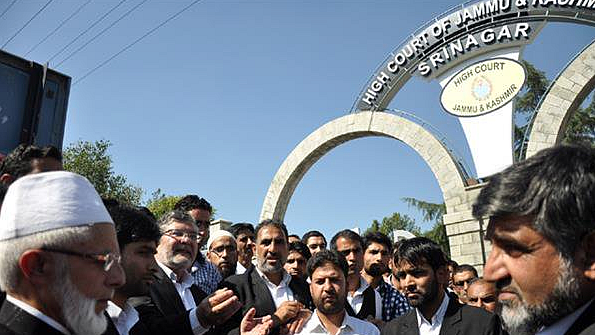The Supreme Court on Wednesday expressed shock at the submission of a bar body of Jammu and Kashmir terming the accession of the state into India as "mysterious" and "controversial" while taking a strong note of it.
The state's Bar Association, which was asked by the apex court to help in finding amicable solution to the protests and stone-pelting, filed an additional affidavit giving reasons for the continuing unrest in the Valley, listing the historical accession of Kashmir to India, “rigged” polls and the "catch-and-kill" policy of the security forces as the reason behind stone pelting, as reported by The Hindu.
“How is your additional affidavit relevant to this SLP (special leave petition)? We are shocked,” a bench comprising Chief Justice Dipak Misra and Justices A M Khanwilkar and D Y Chandrachud, told the bar body.
When Solicitor General (SG) Ranjit Kumar, appearing for the Centre, referred to certain controversial portions of the affidavit, the bench said "we wanted to know the reasons (of protest from the bar body), which is a mistake".
At the outset, the SG said the plea was pending in the Jammu and Kashmir High Court and highlighted the controversial averments made by the bar body in the additional affidavit.
Referring to the affidavit, the Solicitor General said:
They say that the instrument of accession is mysterious and controversial. They allege that every election is rigged.India and Pakistan have fought three wars on the issue... the state is in a troubled state for last 70 years
None of the elections held in the state inspired confidence as they all have been rigged, he said quoting the contents of the affidavit.
The SG then said whatever has been alleged by the bar body was not the part of petition filed before the High Court.
Earlier, the apex court had observed that no meaningful dialogue was possible unless violence stopped in the strife-torn Valley.
The court was hearing the appeal of the Bar Association's Executive Member against the September 22 order of the Jammu and Kashmir High Court.
The High Court had rejected the bar body's plea seeking a ban on use of pellet guns on the ground that the Centre had already set up a Committee of Experts through its memorandum of July 26, 2016 for exploring alternatives to pellet guns.
The top court had said there were "two ways to decide the case at hand. Either the parties sit together and find a solution", or the court decides the case.
It had said the Bar was a "responsible" and "respectable" body and it should help in finding a solution and asked it come up with suggestions to resolve the crisis, including stone-pelting and violent street protests in the Valley.
(With inputs from PTI)
(At The Quint, we question everything. Play an active role in shaping our journalism by becoming a member today.)
